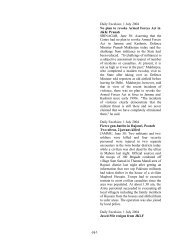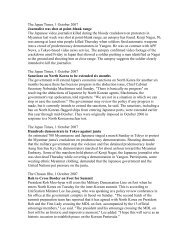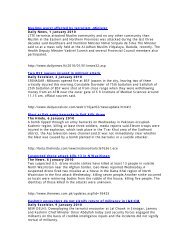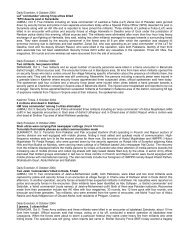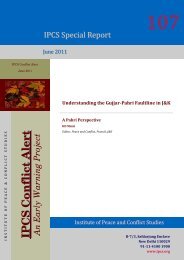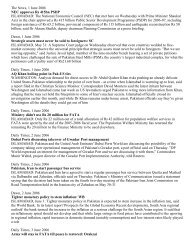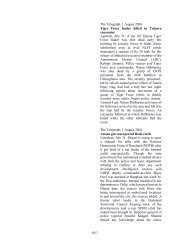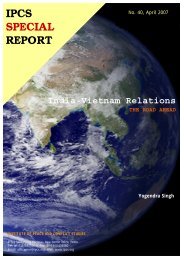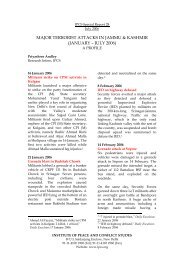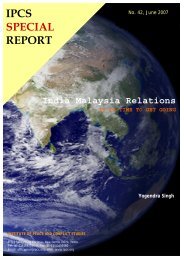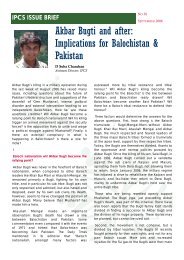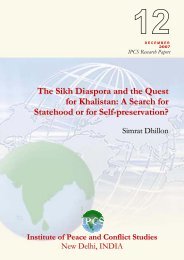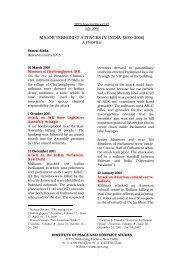India and Southeast Asia: A Personal Narrative from Chennai
India and Southeast Asia: A Personal Narrative from Chennai
India and Southeast Asia: A Personal Narrative from Chennai
Create successful ePaper yourself
Turn your PDF publications into a flip-book with our unique Google optimized e-Paper software.
IPCS SPECIAL REPORT #139, MARCH 2013<br />
II<br />
HOW TO MEASURE THE SUCCESS OF FOREIGN POLICY?<br />
It is appropriate to pose the question: How do we measure the success of <strong>India</strong>n foreign<br />
policy? One yardstick is to anticipate the turn of events <strong>and</strong> adjust the foreign policy<br />
accordingly. Given below are two examples, one of great success <strong>and</strong> the other a colossal<br />
failure. In the early years of independence, when the Western countries were viewing<br />
the communist world as a monolith, Nehru was deeply sensitive to the changes that<br />
were taking place within the communist world. Nehru told President Eisenhower that<br />
the United States should not be obsessed with communism as an ideology because it<br />
contained within itself the seeds of its own destruction. Nehru was conscious of the<br />
widening Sino-Soviet differences <strong>and</strong> how they could have benign fallout for <strong>India</strong>.<br />
In his book, New Dimensions of Peace, Amb Chester Bowles has mentioned that<br />
Nehru told him in early 1950’s that Sino-Soviet entente was unlikely to last long. In<br />
September 1959, in a speech in Parliament, Nehru referred to a statement in TASS <strong>and</strong><br />
how it indicated that the Soviet Union was taking a calm <strong>and</strong> dispassionate view of the<br />
border situation. The TASS statement, as is well known, was the first indication of<br />
Sino-Soviet differences being aired in the open. Nehru knew of the heated exchanges<br />
that took place between Khrushchev <strong>and</strong> Chen Yi in Bucharest, he knew of the Chinese<br />
anger at the Soviet Union selling MIG planes to <strong>India</strong>, the withdrawal of Soviet<br />
technicians <strong>from</strong> China <strong>and</strong> the skirmishes in the Sino-Soviet border in 1960. Nehru<br />
dissociated China’s expansionist policy <strong>from</strong> communist ideology. Such a stance<br />
enabled <strong>India</strong> to take advantage of the Sino-Soviet dispute <strong>and</strong> get considerable support<br />
<strong>from</strong> Soviet Union in the years to come (8).<br />
The failure to correctly fathom the emerging trends was with reference to China.<br />
Jawaharlal Nehru never subscribed to the view that China would resort to the use of<br />
force to buttress its territorial claims <strong>and</strong> when the Chinese invasion took place he<br />
frankly admitted in Parliament that we were living in an “artificial world of our own<br />
creation”. Furthermore ,on several occasions, New Delhi worked on the assumption<br />
that what it wants may come true. In August 1991, there was news of an attempted<br />
coup against Gorbachev. The group opposed to Gorbachev claimed that it had captured<br />
power. Within three days Yeltsin crushed the coup. Unfortunately in the <strong>India</strong>n<br />
Embassy’s assessment the coup was a success <strong>and</strong> the matter was reported to New Delhi.<br />
What is more tragic is that , the <strong>India</strong>n Prime Minister made an announcement<br />
welcoming the coup just before it was crushed. Today Unfortunately <strong>India</strong>’s foreign<br />
policy has become reactive to international developments (9).<br />
What is more regrettable is the fact that on crucial occasions New Delhi failed to st<strong>and</strong><br />
by its cherished principles of foreign policy. <strong>India</strong>’s Indo-China policy after 1978 was<br />
based on its underst<strong>and</strong>ing of the emerging Sino-Vietnamese dispute, the increasing<br />
Sino-Soviet rivalry <strong>and</strong> the unfortunate policy of ostracizing Vietnam by ASEAN, with<br />
the backing of the United States <strong>and</strong> China. Though there were convergence of<br />
interests among New Delhi, Kuala Lumpur <strong>and</strong> Jakarta that it was China, not Vietnam,<br />
which posed the long term threat to the stability <strong>and</strong> security of <strong>Southeast</strong> <strong>Asia</strong>.<br />
On several occasions, the <strong>India</strong>n diplomats adopted a defensive attitude. The decision<br />
in the last moment not to participate as a dialogue partner in the ASEAN Foreign<br />
Ministers meeting in Kuala Lumpur in June 1990 did in no way enhance the prestige<br />
<strong>and</strong> st<strong>and</strong>ing of <strong>India</strong> in <strong>Southeast</strong> <strong>Asia</strong>. Rajaratnam, then Foreign Minister of<br />
Singapore, made the snide remark whether Narasimha Rao was suffering <strong>from</strong> “Russian<br />
07



